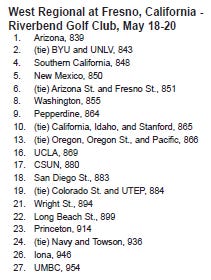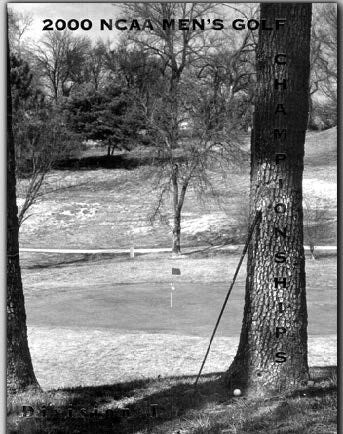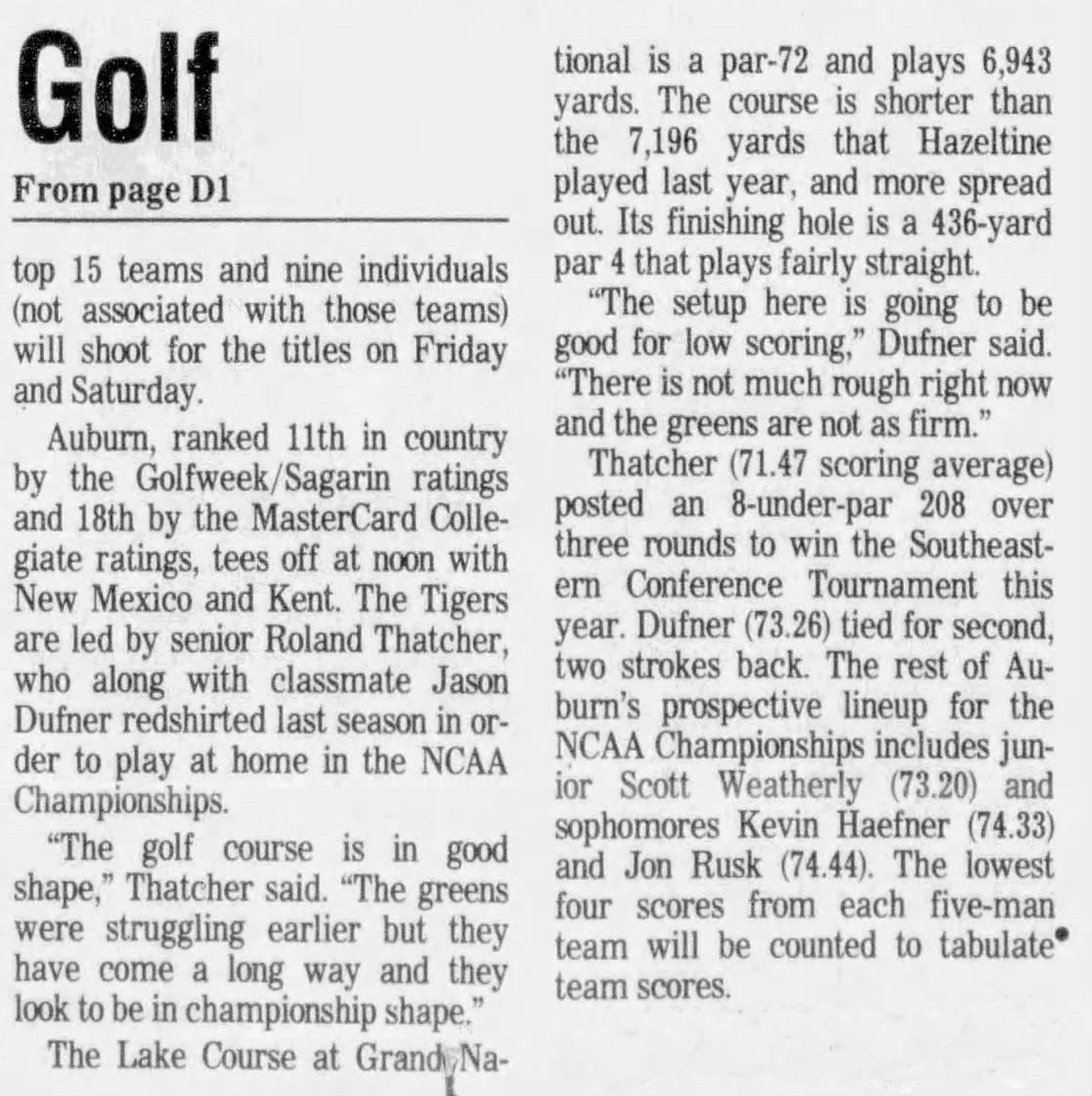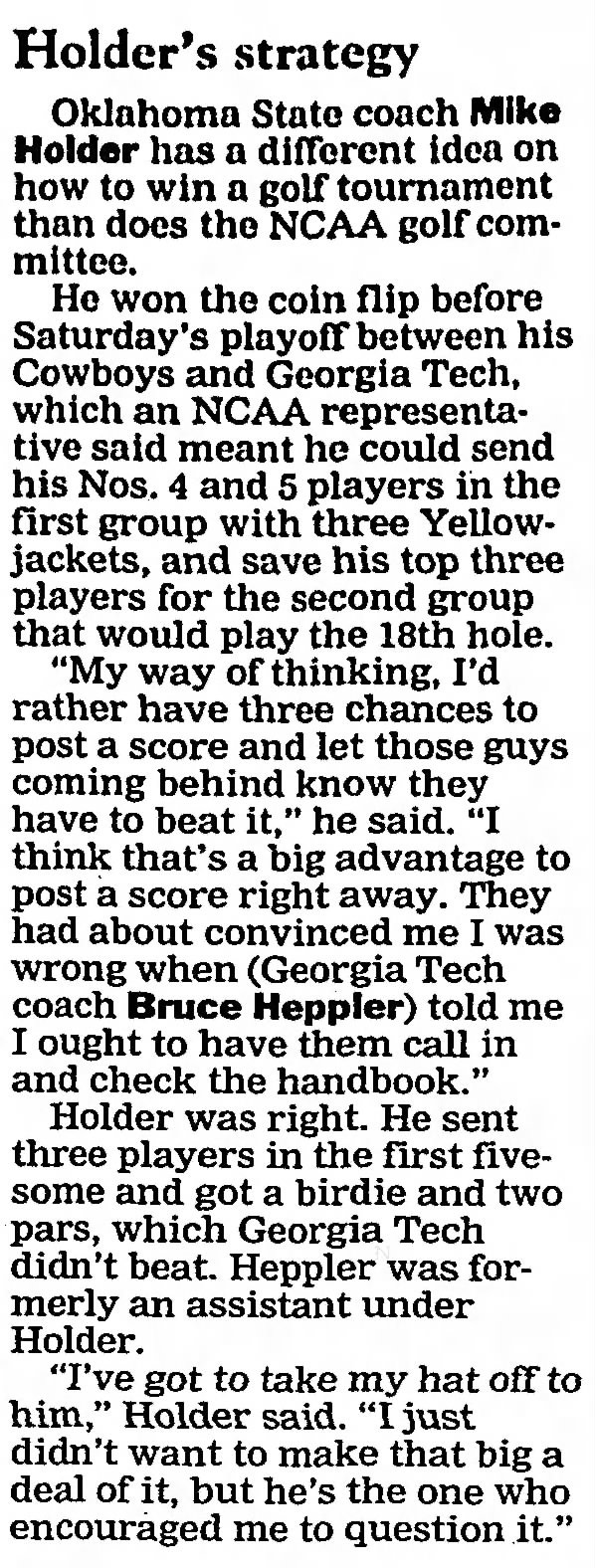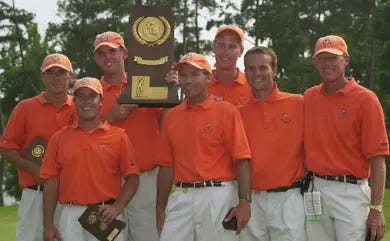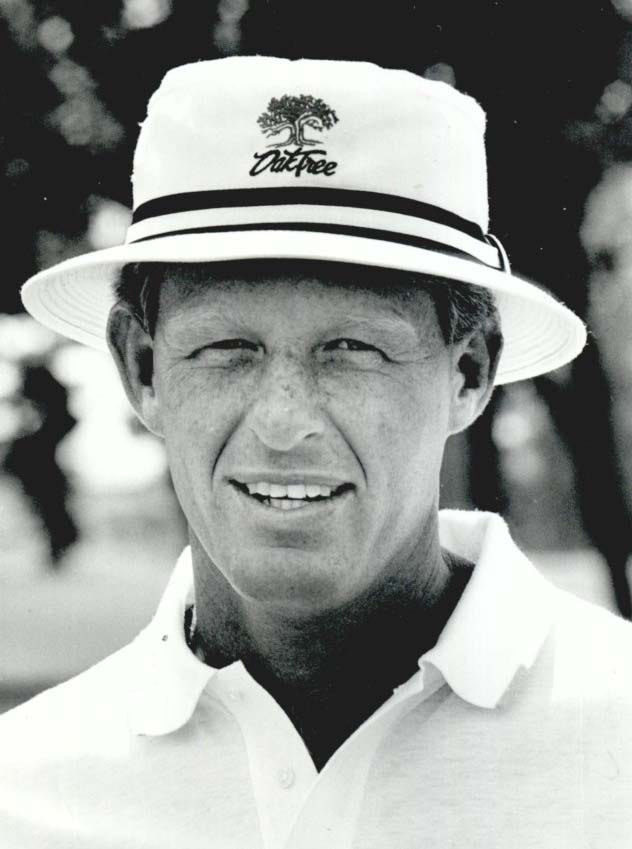This is part of a series on the Men’s Collegiate Championships
NCAA Championship Era: 1939-NOW
REGIONAL ROUND-UP
WEST REGIONAL
Arizona State, lead by Paul Casey, came into the Regional the easy favorite having won 4 of their last 5 tournaments. Their latest win at the PAC-10 championship was historic, winning as a team by 37 strokes thanks in part to Casey’s final round 60, a new NCAA record1. ASU would make it through Regionals but it was much closer than they would have liked, finishing T6 well behind rival Arizona who won by 4 shots over BYU and UNLV. The most exciting aspect of the tournament was the three-way tie for the 10th place, necessitating a 3-hole playoff between Stanford, Cal, and Idaho. It was Cal that ultimately grabbed the final spot thanks in part to a birdie from Walter Chun that Coach Steve Desimone called “…one of the greatest shots I’ve ever seen.”
Pepperdine sophomore Michael Beard was the tournament medalist thanks to a final round 65 which put him 4 shots ahead of UNLV’s Calvin Kupeyan and New Mexico’s Joel Hendry. That 65 also earned Beard a bit of history as he picked up the new course record for Riverbend.
CENTRAL REGIONAL
Texas duo Matt Brost and David Gossett - the reigning US Amateur champion - combined to shoot 11-under on the final day to win the team title and send the Longhorns to the NCAA championships for the first time in three years. Reigning NCAA individual champ Luke Donald finished T3 to help Northwestern hang on through a rough final round, and earn a trip back to the championship as well.
EAST REGIONAL
The main storyline for the first two days was about the rain. Weather was a significant enough factor that tournament officials had to do something they never want to do in these regionals: institute a cut. Concerned they wouldn’t be able to account for any possible tie-break scenarios, they eliminated the last wave of players effectively trimming 6 teams (leaving 21) and 4 of the unaffiliated individuals from playing in the final round.
On the team side, Clemson ran away the title for the 4th time in 8 years. Virginia and UNC went opposite directions on the day - Virginia with a nice 293 to sneak in and UNC with a 301 to almost play their way out - but managed to stay one stroke ahead of Wake Forest to grab the final spots. NC State was given a double blow when Carl Pettersson, leader for the first two days and seeming individual champion at the end of play, signed an incorrect score for a final round 70. The 71 Pettersson actually shot would have been good enough for the individual title and NC State would have advanced to the NCAA championship, but instead his DQ meant the neither was possible as the team had to count an 81 which put them outside the top 10 advancing teams. The individual title went to Michael Morrison who helped his reigning NCAA champion Georgia - top ranked team in the country - return to nationals.
Intercollegiate Championship #103: May 31 - June 3, 2000
Host: Grand National (Auburn)
Format
Team and Individual stroke play
Day 1 = 18 holes
Day 2 = 18 holes
**Cut to top 15 teams as well as those within 18 strokes
**Cut to individuals on teams which made the cut as well as the top 5 individuals not on those teams
Day 3 = 18 holes
Day 4 = 18 holes
**72 holes determines Team and Individual championships
Results
Individual Medalist/Champ: Charles Howell III [Oklahoma State]
David Gossett [Texas], the reigning US Am champ, opened the tournament like the favorite he was with a scorching 63 (-9). He backed that up with a respectable 70 for a 133 total through 36 holes which would normally be good enough for a decent lead, however Charles Howell [Oklahoma State] matched him with rounds of 67-66. Things got even more intense when Gossett posted a third round 66 and lost three strokes to Howell who came in with a 63 of his own! How good was the play at this point? Two players were sub-200 - an important low scoring mark for 54-holes in college golf - with Howell leading the way at 196 (a new NCAA record!) and Gossett close behind at 199. Howell’s 20-under-par performance broke the NCAA championship record of 197 through 54-holes set by Arizona State’s Phil Mickelson in 1992. Although his hot play cooled a bit (relatively) with a final round 69 - his highest score of the tournament - Howell was able to cruise in for an 8 stroke victory. His 23-under-par total shattered the previous record of 17-under which was set by John Inman [UNC] in 1984 and later matched by Phil Mickelson [Arizona State] in 1992, Justin Leonard [Texas] in 1994, and James McLean [Minnesota] in 1998. For an incredible 1999-2000 season in which he also broke the Oklahoma State single-season stroke average shared by legends Lindy Miller (1978) and Bob Tway (1981), Charles Howell III earned three prestigious college golf awards: Jack Nicklaus Award, Arnold Palmer Award, and the Fred Haskins Award.
Team Champ: *Oklahoma State (9 NCAA, 9 overall)
Texas got off to a crazy hot start with a 7 shot lead over Georgia Tech (8 over Oklahoma State) after the first round, which promptly disappeared in the second round. Through 36 holes, Oklahoma State held a slim 1 stroke lead over Texas and was 5 shots ahead of Georgia Tech. At this cut point, the 15th and final team spot had to be determined by a sudden-death playoff - the same 5-count-4 format that decided the 1995 championship - in which Wake Forest put out the defending champion Georgia team. After the third round, OSU gained some breathing room with a 3 shot lead over Texas and 8 over Georgia Tech. The final round seemed like it would be a cakewalk for OSU to gain their 9th team title, but Georgia Tech had other plans. Things went in such opposite directions for the two teams that through 14 holes, it was Tech who was up by 5 strokes. Those final 4 holes was a roller coaster of emotions for both teams. Two OSU players put their approach shots into the bleachers behind the 18th green, the first resulting in a bogey that lost them their 1-shot lead and the second (Charles Howell) preserving the tie with an incredible up-and-down par. When it was all said and done, both Oklahoma State and Georgia Tech stood tied atop the leaderboard at a record-breaking 36-under-par (the previous was set by UNLV in 1998 but that 34-under-par mark was only good enough for 3rd this year).
THE PLAYOFF
Coach Mike Holder had been in this position before. Just 5 years prior, his team defeated the reigning NCAA champ Stanford Cardinals - led by freshman phenom Tiger Woods - to win the 1995 NCAA championship. For only the second (and last) time in the tournament’s history, the team championship would once again be decided by a sudden-death playoff using the same format that determined the team cut just two day prior. Facing a team coached by none other than Bruce Heppler, his former assistant coach during that 1995 championship, Coach Holder had a specific strategy in mind:
Coach Holder’s strategy would prove prophetic as the only birdie scored by either team on that 73rd hole (#18) was made by OSU freshman J.C. DeLeon in the first group. The other four Oklahoma State players scored pars while Georgia Tech took three pars and two bogeys, giving OSU the title with a 5-count-4 score of 1-under to Tech’s 1-over.
Despite the loss, Georgia Tech would remain atop both the coaches and computer end of the season polls.
COACHES CORNER: Mike Holder [Oklahoma State]
Mike Holder has always been an OSU Cowboy. First, he was a three time All-American (honorable mention, 3rd team, 3rd team) in the 3 years that he played under Coach Labron Harris 1968-70. His senior year, Holder was the Big Eight Conference medalist and helped OSU capture another team title, the 12th in the 13 year existence of the conference. After earning first his B.S. in Marketing in 1970 then his M.B.A. in 1973 (both at Oklahoma State), Holder took over as head coach in July, 1973, becoming just the second coach in program history after Coach Harris started Oklahoma State - then Oklahoma A&M - golf in 1947 and ran it for the next 26 years. Coach Holder's coaching career:
1974: NCAA = 5th
Big Eight team Champion, individual Champ = Jaime Gonzalez
1975: NCAA = runner-up
Big Eight team Champion, individual Champ = Tom Jones
1976: NCAA = CHAMPION
Big Eight team Champion, individual Champ = Lindy Miller
1977: NCAA = runner-up
Big Eight team Champion, individual Champ = Lindy Miller
1978: NCAA = CHAMPION, NCAA individual Champ = David Edwards
Big Eight team Champion, individual Champ = Lindy Miller
1979: NCAA = runner-up
Big Eight team Champion, individual Champ = Bob Tway
1980: NCAA = CHAMPION
Big Eight team Champion, individual Champ = Rafael Alarcon
1981: NCAA = 4th
Big Eight team Champion
1982: NCAA = runner-up
Big Eight team Champion, individual Champ = Willie Wood
1983: NCAA = CHAMPION
Big Eight team Champion
1984: NCAA = runner-up
Big Eight team runner-up, individual Champ = Scott Verplank
1985: NCAA = runner-up
Big Eight team Champion
1986: NCAA = runner-up, NCAA individual Champ = Scott Verplank
Big Eight team Champion, individual Champ = Brian Watts
1987: NCAA = CHAMPION, NCAA individual Champ = Brian Watts
Big Eight team Champion, individual Champ = Michael Bradley
1988: NCAA = runner-up, NCAA individual Champ = EJ Pfister
Big Eight team Champion, individual Champ = EJ Pfister
1989: NCAA = 4th
Big Eight team Champion, individual Champ = Kevin Wentworth
Regional team Champion, individual medalist = Kevin Wentworth
1990: NCAA = 4th
Big Eight team Champion, individual Champ = Kevin Wentworth
Regional team Champion, individual medalist = Kevin Wentworth
Regional Coach of the Year
1991: NCAA = CHAMPION
Big Eight team Champion
Regional team runner-up
Regional Coach of the Year
1992: NCAA = 3rd
Big Eight team runner-up, individual Champ = Alan Bratton
Regional team 3rd
1993: NCAA = 12th
Big Eight team Champion
Regional team 3rd
1994: NCAA = 5th
Big Eight team Champion
Regional team 3rd
Regional Coach of the Year
1995: NCAA = CHAMPION (won playoff)
Big Eight team Champion, individual Champ = Alan Bratton & Chris Tidland
Regional team runner-up, individual medalist = Alan Bratton
Regional Coach of the Year
Dave Williams Coach of the Year
1996: NCAA = 8th
Big Eight team Champion, individual Champ = Kris Cox
Regional team 6th
1997: NCAA = 5th
Big 12 team Champion, individual Champ = Leif Westerberg
Regional team Champion, individual co-medalist = Bo Van Pelt
1998: NCAA = 4th
Big 12 team Champion
Big 12 Coach of the Year
Regional team T7
1999: NCAA = runner-up
Big 12 team 4th
Regional team 4th
2000: NCAA = CHAMPION (won playoff), NCAA individual Champ = Charles Howell
Big 12 team Champion, individual Champ = Charles Howell
Big 12 Coach of the Year
Regional team 3rd
Dave Williams Coach of the Year
2001: NCAA = MC
Big 12 team 5th
Regional team 6th
2002: NCAA = 16th
Big 12 team runner-up, individual Champ = Anders Hullman
Regional team Champion
2003: NCAA = runner-up
Big 12 team runner-up, individual Champ = Hunter Mahan
Regional team Champion
Regional Coach of the Year
2004: NCAA = 13th
Big 12 team 3rd
Regional team runner-up
2005: NCAA = 15th
Big 12 team Champion
Big 12 Coach of the Year
Regional team runner-up
Regional Coach of the Year
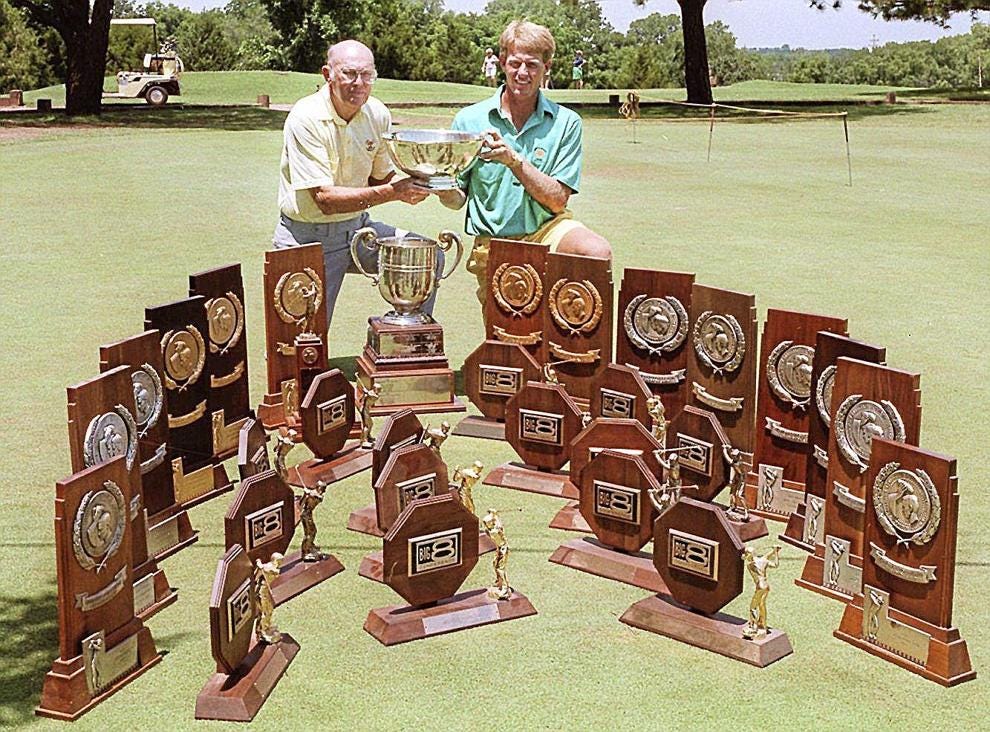
FINAL TOTALS: 32 year career
NCAA Team Championships = 8 (in 32 appearances = 25%)
At least 1 championship every decade from the 1970s to the 2000s
Peak run from 1975-1988 (14 years)
5 championships and 8 runner-up finishes
Runner-Ups = 10
Finished in top 3 in 19 of 32 appearances = 59%
Finished in top 5 in 26 of 32 appearances = 81%
Finished outside the top 10 only 5 times
NCAA Individual Championships = 5
Conference Team Championships = 25 (in 32 appearances = 78%)
Never finished worse than 5th
Runner-up = 4, 3rd place = 1, 4th place = 1, 5th place = 1
Conference Individual Championships = 22
18 different players
Regional Team Championships = 5 (in 17 appearances = 29%)
Finished in top 3 in 13 of 17 appearances = 76%
2nd = 4, 3rd = 4
Never finished outside of top 8
Regional Individual Medalists = 3
Conference Team Championships = 25
Big Eight = 21
Big 12 = 4
Conference Individual Medalists = 22
Big Eight = 18
Big 12 = 4
Career coaching wins = 179
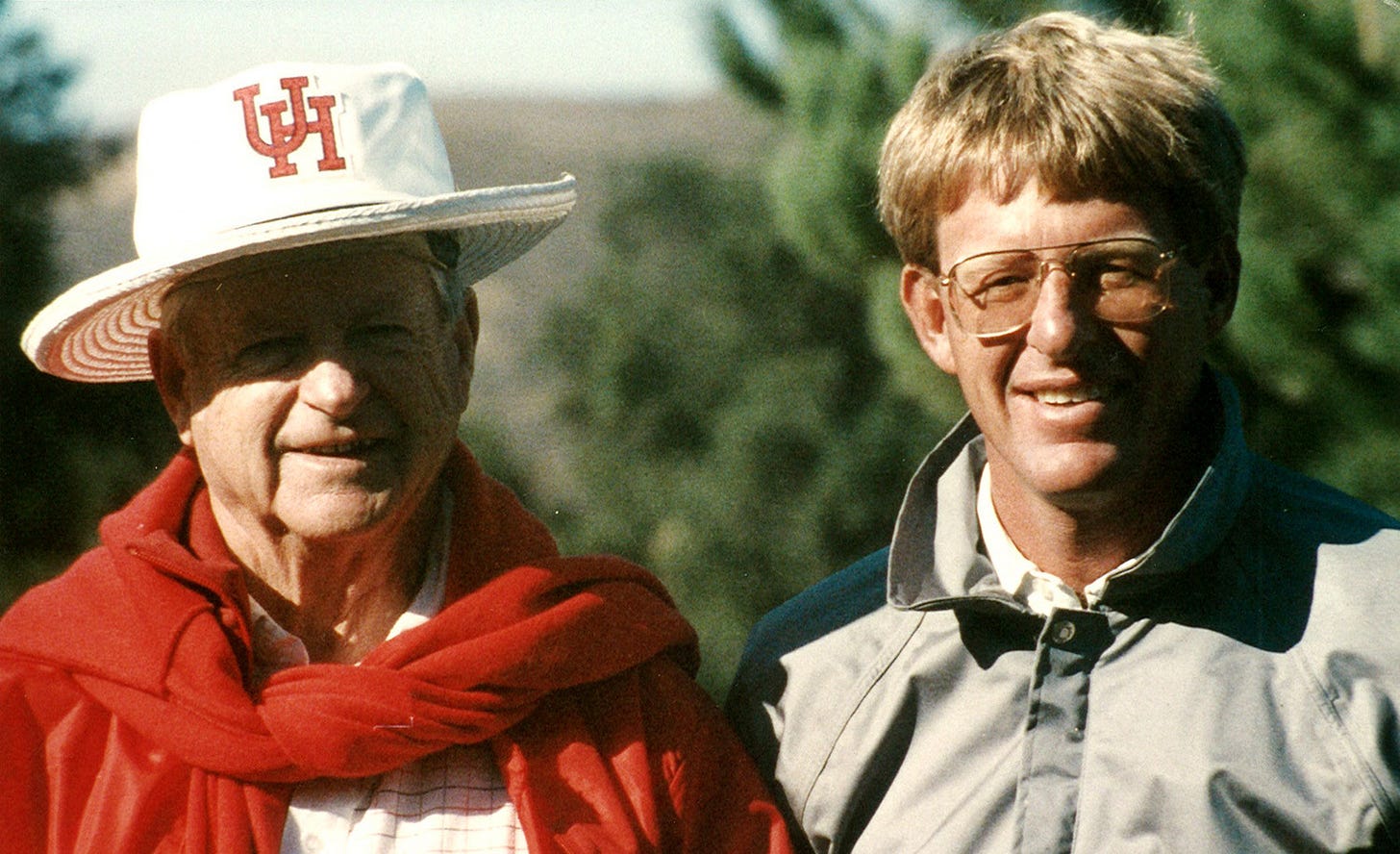
After turning over coaching responsibilities to assistant Mike McGraw in 2005, Holder took up the mantle of AD, a position he held until his retirement in 2021. Although he no longer had a direct hand in the golf team success, Coach/AD Holder guided the entire athletic program as Coach McGraw promptly won the school’s 10th men’s team title in 2006 - and would have won two more under the current format if a match play component had not been added in 2009 - and an 11th was added under the direction of Coach Alan Bratton in 2018. Few individuals can say they had as much of an impact on their school’s athletic program as Mike Holder has done for Oklahoma State.
Thanks for reading!
Up Next:
In the next post we will cover the 2009 championship which saw the return of match play to decide the team title. An unexpected first round matchup and an incredible ending basically guaranteed the format would stick around as the NCAA tournament committee prepared to get college golf on TV annually.
Since the NCAA does not have a complete database of historical scores, nobody knows for sure that Paul Casey’s 60 is the lowest score shot in a college tournament, just like it’s not known for sure if Tiger’s 61 in 1996 - also at the PAC-10 championship incidentally - was the low score to that point. That said, NCAA officials have since declared (repeatedly) that 60 is the low scoring mark for 18 holes in a college golf tournament, a fact that has been reiterated each time “Club 60” gets a new member.




